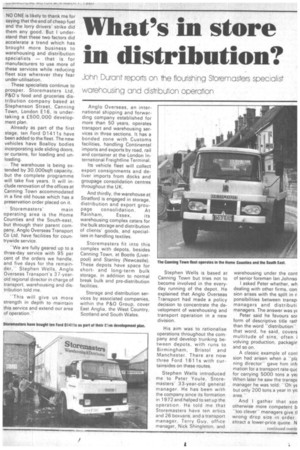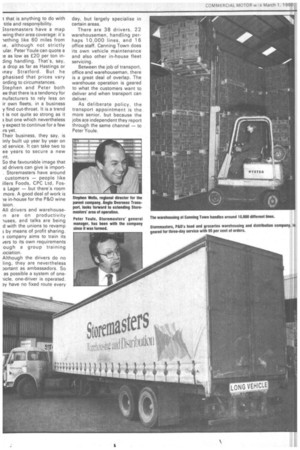What's in store in distribution?
Page 49

Page 50

If you've noticed an error in this article please click here to report it so we can fix it.
John Durant repot on e flourishing Storemasters specialist warehousing and cistribution operation
NO ONE is likely to thank me for saying that the end of cheap fuel and the lorry drivers' strike did them any good. But I understand that these two factors did accelerate a trend which has brought more business to warehousing and distribution specialists — that is for manufacturers to use more of these services while reducing fleet size wherever they fear under-utilisation.
These specialists continue to prosper. Storemasters Ltd, P&O's food and groceries distribution company based at Stephenson Street, Canning Town, London El 6, is undertaking a £500,000 development plan.
Already as part of the first stage, ten Ford D141 1s have been added to the fleet. The new vehicles have Boalloy bodies incorporating side sliding doors, or curtains, for loading and unloading.
The warehouse is being extended by 30,000sqft capacity, but the complete programme will take five years. It will include renovation of the offices at Canning Town accommodated in a fine old house which has a preservation order placed on it.
Storemasters' main operating area is the Home Counties and the South-east, but through their parent company, Anglo Overseas Transport Co Ltd, have facilities for countrywide service.
-We are fully geared up to a three-day service with 95 per cent of the orders we handle, and five days for the remainder,Stephen Wells, Anglo Overseas Transport's 37-yearold regional director in charge of transport, warehousing and distribution told me.
"'This will give us more strength in depth to maintain this service and extend our area of operation." Anglo Overseas, an international shipping and forwarding company established for more than 50 years, operates transport and warehousing services in three sections. It has a bonded zone with Customs facilities, handling Continental imports and exports by road, rail and container at the London International Freightline Terminal.
Its vehicle fleet will collect export consignments and deliver imports from docks and groupage consolidation centres throughout the UK.
And thirdly, the warehouse at Stratford is engaged in storage, distribution and export grou page consolidation. At Rainham, Essex, its warehousing complex caters for the bulk storage and distribution of clients' goods, and specialises in handling textiles.
Storemasters fit into this complex with depots, besides Canning Town, at Bootle (Liverpool) and Stanley (Newcastle). These depots have space for shortand long-term bulk storage, in addition to normal break bulk and pre-distribution facilities.
Storage and distribution services by associated companies, within the P&O Group, cover East Anglia, the West Country, Scotland and South Wales. Stephen Wells is based at Canning Town but tries not to become involved in the everyday running of the depot. He explained that Anglo Overseas Transport had made a policy decision to concentrate the development of warehousing and transport operation in a new division.
His aim was to rationalise operations throughout the company and develop trunking between depots, with runs to Birmingham, Bristol and Manchester. There are now three Ford 1611s with curtainsides on these routes.
Stephen Wells introduced me to Peter Youle, Storemasters' 33-year-old general manager. He has been with the company since its formation in 1972 and helped to set up the operation. He told me that Storemasters have ten artics and 26 boxvans, and a transport manager.. Terry Guy, office manager, Nick Shingleton, and warehousing under the cont of senior foreman Ian Johnso I asked Peter whether, wh dealing with other firms, con sion arises with the split in r. ponsibilities between transp managers and distributi managers. The answer was y( Peter said he favours sor form of descriptive title rat than the word "'distribution"' that word, he said, covers multitude of sins, often i volving production, packagin and so on.
A classic example of coni sion had arisen when a "pIE fling directorgave him inf( mation for a transport rate qur for carrying 5000 tons a ye When later he saw the transp( manager he was told: "Oh yE but only 200 tons a year in yo area .
And I gather that son otherwise more competent b -too clever" managers give tl wrong drop size in order attract a lower-price quote. N
t that is anything to do with title and responsibility.
3toremasters have a map wing their area coverage: it's -iething like 60 miles from ie, &though not strictly ular. Peter Youle can quote a 2 as low as £20 per ton inling handling. That's, say, a drop as far as Hastings or iney Stratford. But he phasised that prices vary ording to circumstances.
Stephen and Peter both ee that there is a tendency for nufacturers to rely less on ir own fleets, in a business y find cut-throat. It is a trend t is not quite so strong as it 5 but one which nevertheless y expect to continue for a few [rs yet.
rheir business, they say, is inly built up year by year on )d service. It can take two to ee years to secure a new frt.
So the favourable image that drivers can give is import. Storemasters have around customers — people like illers Foods, CPC Ltd, Foss Lager — but there's room more. A good deal of work is le in-house for the P&O wine ision.
All drivers and warehousen are on productivity -iuses, and talks are being d with the unions to revamp ; by means of profit sharing.
company aims to train its er s to its own requirements ough a group training .ociation.
Although the drivers do no ling, they are nevertheless Portant as ambassadors. So as possible a system of one one-driver is operated. ay have no fixed route every day, but largely specialise in certain areas.
There are 38 drivers, 22 warehousemen, handling perhaps 10,000 lines, and 16 office staff. Canning Town does its own vehicle maintenance and also other in-house fleet servicing.
Between the job of transport, office and warehouseman, there is a great deal of overlap. The warehouse operation is geared to what the customers want to deliver and when transport can deliver.
As deliberate policy, the transport appointment is the more senior, but because the jobs are independent they report through the same channel — to Peter Youle.
















































































































